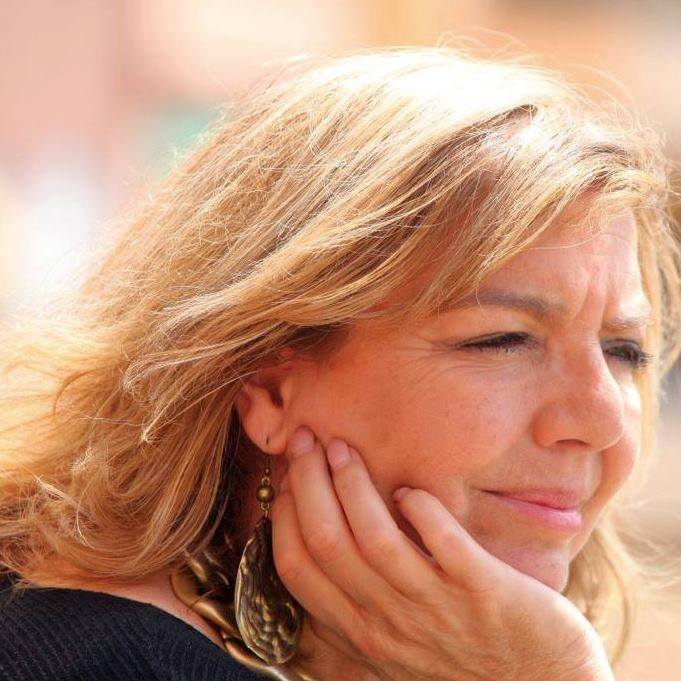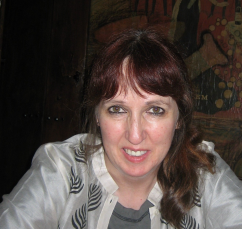©Luísa Jacinto, Frio, 2020, óleo sobre madeira, 10×15 cm www.luisajacinto.com
Translated by Hilary Owen
Edited by Andrew McDougall
“Yours was the Great Age of Indignation, and mine is the Great Age of Resignation. So what does that leave us with? Poetry and imagination.”
Dear Grandfather,
I have some bad news for you. The march of darkness that had come to a halt in your day has resumed again in mine, and now it’s even darker. We have no vaccines, and yet every day, someone promptly invents one. We have become used to living like this, and a life dictated by precautions is the worst of all lives. There were some really spectacular conspiracy theories in your day, mother told me about them, but nothing like what is going on now. Only yesterday, a Nobel-nominated Australian doctor, broadcasting live to the whole world, announced that the lack of physical affection, sex and romance, because of people fearing death and helplessness, will eventually lead to men having no semen and women who can’t menstruate – can you imagine that? And you know what? The most astonishing thing was not what he actually said, but the fact that none of my colleagues even reacted to it. Some of them laughed, a couple of them shrugged, but none of them took the time to comment, and the next day it wasn’t even discussed on social media. It is incredible how two generations can belong to such profoundly different eras. Yours was the Great Age of Indignation, and mine is the Great Age of Resignation. So what does that leave us with? Poetry and imagination. But reciting poetry at a time like this feels rather dubious too, though I am not sure why.
People are walking around reciting poetry, nearly all of it by dead people. You could be forgiven for thinking no one is writing anything new, because the Muses are not immune to the virus either, or, to be precise, they can spread it but they don’t catch it. Anyway. Transgression has died the death, so has Bohemianism, and even good old-fashioned sin is criminalized – it is difficult to be pure, grandfather. ‘If my demons abandon me’, as Rilke once said (and he was a distant cousin of Pessoa’s), ‘I fear that my angels will disappear too.’ But I don’t want you to think I have been totally contaminated by despair. That wouldn’t be true, but it is getting even harder than it was in your day to tell truth from lies – even for me, and I inherited your daughter’s gift of clairvoyance. I carry your words close to my heart like a religious relic. And they shield me in times of misfortune. I never forget them.
You once told me I should have a dream and that bursting with that dream, I should strive to improve the world – those were your very words. But I fear I shall disappoint you, since the only dream I have now is to actually have a dream at all, and who knows when that will be. Everything has become so confused, grandfather. We have replicants among us, programmed to look like people, and human beings who can think but who are acting like machines. Not even the Device can tell the difference, and when we are not sure, we use special electronic kits to do a quick check: if we are people it turns green and if we are not, it goes red – but why the colour green, I wonder? Only today I found out that the person who feeds my dog is actually one of these avatars. And time, yes even time, plays tricks on us. I don’t know the real age of my friends, or if they exist or indeed if they have ever existed, and more importantly, I don’t know whether they are my friends or not. It is true, grandfather. The dead could, in fact, be living and vice versa, and no one would say anything. And this is how we have to live, in this orphaned, adult state and I am overwhelmed with grief that I never became a mother myself. In the 50s, when you were already in the great beyond, they came up with a drug that could cure insomnia, sadness and remorse with a single pill. Maybe that was what did it.
But there is a strong core to our humanity that no scourge can destroy, and I see that myself. When it rains you can still see the sun behind the clouds, waiting for its moment to return, the timid acts of kindness that men perform, and the looks of forgiveness dawning on women’s hardened faces – will that be enough? No, it won’t and I am glad it won’t, dear grandfather, who once addressed your daughter’s belly with the words you wrote as a blessing for me.
Read the original chapter in Portuguese

Rita Ferro (Lisbon, 1955) studied interior design and specialised in marketing. She has taught print advertising and worked as a manager and consultant for several companies. For the past 30 years, she has written novels, letters, biographies, chronicles, children’s literature and plays. Her biographic novel, A Menina é Fillha de Quem? (2011), was awarded the Prémio PEN Clube Português de Narrativa. Um Amante no Porto (2018) is her most recent novel.

Hilary Owen is Emeritus Professor of Portuguese and Luso-African Studies at Manchester University and Research Fellow in Portuguese at the University of Oxford. She is the author of Mother Africa, Father Marx. Women’s Writing of Mozambique, 1948-1992 and the co-author with Cláudia Pazos Alonso of Antigone’s Daughters? Gender, Genealogy and the Politics of Authorship in 20th-century Portuguese Women’s Writing. She is also the co-editor with Mariana Liz of Women’s Cinema in Contemporary Portugal, and with Claire Williams of Transnational Portuguese Studies. She has translated the poetry of Noémia de Sousa.
Listen to this chapter on Facebook read by Ben Slack
(video production by Gabriela Ruivo)
Escape Goat is the twin page of Bode Inspiratório
All content subject to copyright. All rights reserved
